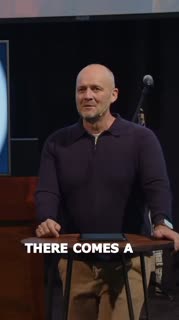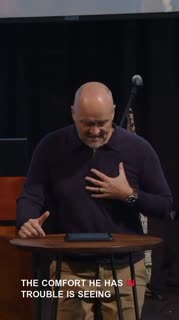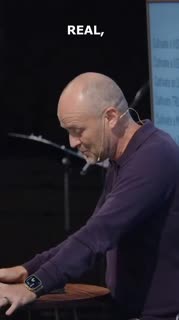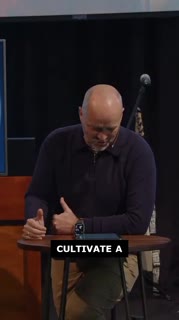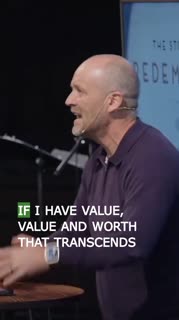Finding True Security in God's Eternal Blessings
Devotional
Sermon Summary
Bible Study Guide
Sermon Clips
1. "There comes a time in every follower of Jesus's life where we have to ask ourselves am I willing to embrace reproach for the sake of Christ greater than all the treasure maybe not of Egypt but of Canada am I willing to say everything I have is an open hand for the sake of following Christ because we know that that our wealth our privilege all of those things can get inside of our hearts and give us that sense that false sense of security and one of the reasons we get so worked up about suffering when we face some sort of trauma or affliction in our life that we have been talking about is because we think god should continue blessing us what have I done lord that that this trouble would come my way and we've been banging on that point the world's broken and we're broken in it and bad things happen because bad things happen in a broken and and beat up world" [31:53] (62 seconds)
2. "The comfort he has in trouble is seeing the futility of those who are trying to derive comfort from their wealth that he's saying that they are focused on earthly things and the comfort that comes from that is it's causing him to think about eternal things that he looks and he sees the despair even though people have that they're consumed with with gathering with hoarding with keeping with controlling and he's been liberated from that he's claiming comfort from what god has done and that has juxtaposed the priorities and lifestyles of the world around him the contrast is between the wise and the fool we see that in in in scripture often and we don't equate somebody's wealth with their morality or their foolishness right we don't say rich people are wise and poor people are fools we also don't say poor people are wise and rich people are fools we don't say any of that because money wealth has no morality it is amoral it doesn't matter how your morality doesn't come from what you have it's what you do with what you have but it can deceive us into believing that it can give us salvation and that's the concern here is he's saying it can't save you your wealth the things of this world can't say save you" [37:52] (85 seconds)
3. "The value of a human soul is real, is profound, and is beautiful. It puts us in a really difficult paradox that we are eternally valuable, but we're inherently destitute. That we are incredibly valuable, more valued than we could ever imagine, and more lost than we could ever believe. And yet, what is the answer? The answer is that God sees the paradox and answers it. That the love of God that loves everyone, all of creation, sees us in the paradox and answers it. That the love of God is in our need and meets us there. God would be evil if he loved us, saw our brokenness, and said, I'm not going to do anything about it, but he does it. How? By taking on human flesh, by dying in our place, by giving us the hope of an atonement, of an assurance of salvation that cannot be bought, that cannot be accomplished. He has given us that. He has given us the freedom that if we believe that, we are fully and ultimately secure for all of eternity." [55:00] (57 seconds)
4. "Cultivate a vision of heaven. Cultivate a vision of Jesus. I cannot wait to see him. I think about it. Whatever they say at my funeral, if we have one, if they have one, the only words that matter are when I get there that he would say, well done, good and faithful servant. That's it. That's all. The goodness he's already given me. He's already declared me righteous. When I place my faith in him, I'm given this righteousness. Therefore, I don't have to live up to his expectation of goodness. I just have to receive his on me. And then just be faithful to him. I don't have to live up to his expectation of goodness. I just have to receive his on me. Not awesome. Don't have to get it all right. Don't have to be successful. Just faithful. How liberating is that? That that could be the vision. That we could pass from this life into the next and just hear Jesus say, well done. Free. Why would I risk any of that to find joy from worldly things?" [53:26] (68 seconds)
5. "If I have value, value and worth that transcends eternity, then I don't have to live for now anymore. I can be freed of that. If I have a hope that I'm going to live forever, I don't have to get it all now. If I believe that God sees me, knows me, and saves me, that he paid the ransom for my life, then I can be liberated to follow him and his call and spread his goodness and his kindness without being defensive. We're so defensive. That's why when we read Psalm 49, we need to recognize what might be going on in our hearts. We're saying, this is not about me. Sure? Are you sure? We live in maybe one of the wealthiest neighborhoods in the world, for sure. And that makes us dangerous." [44:04] (58 seconds)
Ask a question about this sermon
2. "The comfort he has in trouble is seeing the futility of those who are trying to derive comfort from their wealth that he's saying that they are focused on earthly things and the comfort that comes from that is it's causing him to think about eternal things that he looks and he sees the despair even though people have that they're consumed with with gathering with hoarding with keeping with controlling and he's been liberated from that he's claiming comfort from what god has done and that has juxtaposed the priorities and lifestyles of the world around him the contrast is between the wise and the fool we see that in in in scripture often and we don't equate somebody's wealth with their morality or their foolishness right we don't say rich people are wise and poor people are fools we also don't say poor people are wise and rich people are fools we don't say any of that because money wealth has no morality it is amoral it doesn't matter how your morality doesn't come from what you have it's what you do with what you have but it can deceive us into believing that it can give us salvation and that's the concern here is he's saying it can't save you your wealth the things of this world can't say save you" [37:52] (85 seconds)
3. "The value of a human soul is real, is profound, and is beautiful. It puts us in a really difficult paradox that we are eternally valuable, but we're inherently destitute. That we are incredibly valuable, more valued than we could ever imagine, and more lost than we could ever believe. And yet, what is the answer? The answer is that God sees the paradox and answers it. That the love of God that loves everyone, all of creation, sees us in the paradox and answers it. That the love of God is in our need and meets us there. God would be evil if he loved us, saw our brokenness, and said, I'm not going to do anything about it, but he does it. How? By taking on human flesh, by dying in our place, by giving us the hope of an atonement, of an assurance of salvation that cannot be bought, that cannot be accomplished. He has given us that. He has given us the freedom that if we believe that, we are fully and ultimately secure for all of eternity." [55:00] (57 seconds)
4. "Cultivate a vision of heaven. Cultivate a vision of Jesus. I cannot wait to see him. I think about it. Whatever they say at my funeral, if we have one, if they have one, the only words that matter are when I get there that he would say, well done, good and faithful servant. That's it. That's all. The goodness he's already given me. He's already declared me righteous. When I place my faith in him, I'm given this righteousness. Therefore, I don't have to live up to his expectation of goodness. I just have to receive his on me. And then just be faithful to him. I don't have to live up to his expectation of goodness. I just have to receive his on me. Not awesome. Don't have to get it all right. Don't have to be successful. Just faithful. How liberating is that? That that could be the vision. That we could pass from this life into the next and just hear Jesus say, well done. Free. Why would I risk any of that to find joy from worldly things?" [53:26] (68 seconds)
5. "If I have value, value and worth that transcends eternity, then I don't have to live for now anymore. I can be freed of that. If I have a hope that I'm going to live forever, I don't have to get it all now. If I believe that God sees me, knows me, and saves me, that he paid the ransom for my life, then I can be liberated to follow him and his call and spread his goodness and his kindness without being defensive. We're so defensive. That's why when we read Psalm 49, we need to recognize what might be going on in our hearts. We're saying, this is not about me. Sure? Are you sure? We live in maybe one of the wealthiest neighborhoods in the world, for sure. And that makes us dangerous." [44:04] (58 seconds)
